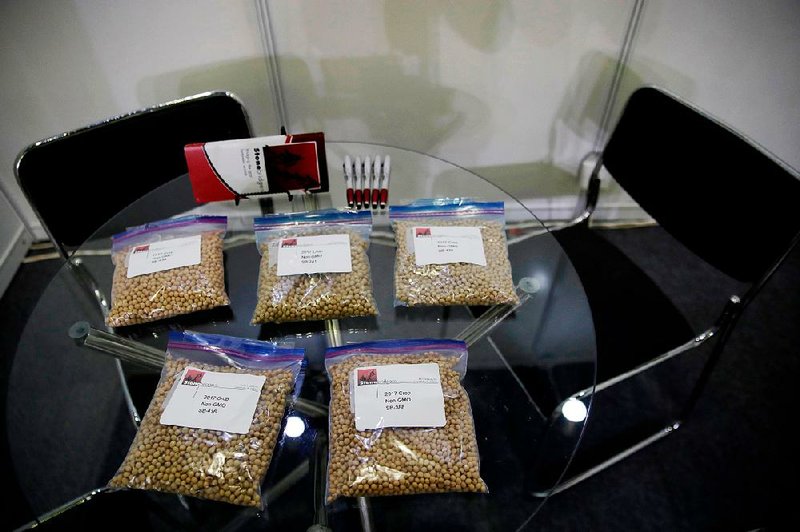BEIJING -- China announced Wednesday that it will exempt American industrial grease and some other imports from tariff increases in a trade war with Washington but kept in place penalties on soybeans and other major U.S. exports ahead of negotiations next month.
The move applies to raw materials for farmers and factories, suggesting Beijing wants to limit damage to its slowing economy from the fight with President Donald Trump over trade and technology.
On Wednesday evening, Trump announced that the U.S. has agreed to a two-week delay in a planned increase in tariffs on some Chinese imports, calling it "a gesture of good will."
In a tweet, Trump said Chinese Vice Premier Liu He requested the delay "due to the fact that the People's Republic of China will be celebrating their 70th Anniversary ... on October 1st." The tariffs are now scheduled to rise Oct. 15.
The ripple effect of the trade war widened earlier in the day when the Trump administration announced that it had drafted an executive order that would increase inspections of mailed packages, in an effort to crack down on shipments of counterfeit goods and deadly drugs from foreign nations including China.
The order would empower the U.S. Postal Service to increase inspections of small packages that arrive in the country by air, according to several people familiar with the draft, who declined to be named because they were not authorized to speak publicly. That would help to close a loophole that has allowed dangerous drugs like the opioid fentanyl and other contraband to pass into the United States unchecked.
In conjunction with the trade battles, Trump has accused China of failing to stop shipments of fentanyl from flowing into the United States.
Trump responded to the China's announcement of the tariff exemptions with a morning Twitter post that suggested he believed the move showed Beijing's resolve weakening.
"China suspends Tariffs on some U.S. products," he wrote. "Being hit very hard, supply chains breaking up as many companies move, or look to move, to other countries. Much more expensive to China than originally thought."
A list of 16 items including lubricants, whey, fish meal for animal feed, insecticides and some other chemicals will be exempt from penalties of up to 25% imposed in response to Trump's tariff increases on Chinese products, the Finance Ministry said. The items will be exempt for a year starting Tuesday.
China's duties on soybeans, the biggest U.S. export to China, and thousands of other items were left unchanged.
Word that talks are going ahead has helped calm jittery financial markets. But there has been no sign of progress.
Negotiators for the two countries hope to reach a relatively modest deal in the coming weeks that would have China buy more U.S. farm products in exchange for the United States lifting some restrictions on Chinese telecommunications giant Huawei. Such an agreement could help lay the groundwork for a broader deal.
The Finance Ministry's announcement coincided with a visit to Beijing by U.S. business executives who are meeting with senior Chinese government officials. U.S. firms that operate on both sides of the Pacific are increasingly uneasy about the state of relations between the two countries.
On Wednesday, the U.S. executives met with Premier Li Keqiang for more than an hour, according to Myron Brilliant, executive vice president of the U.S. Chamber of Commerce, which organized the visit with the China Center for International Economic Exchanges.
Some technology companies have expressed frustration over the Trump administration's decision to thrust Huawei into the trade dispute. Companies like Google, Facebook and Microsoft are examining their businesses in an effort to understand the scope of the blacklist. Systems made by Google and Microsoft, for example, are used in Huawei phones around the world.
Chinese leaders are resisting U.S. pressure to roll back plans for government-led creation of global competitors in robotics and other industries.
Washington, Europe, Japan and other trading partners say those plans violate China's market-opening commitments and are based on stealing or pressuring companies to hand over technology.
Trump has imposed or announced penalties on about $550 billion of Chinese products, or almost everything the United States buys from China. Tariffs of 25% imposed previously on $250 billion of Chinese goods are now due to rise to 30% on Oct. 15.
China has raised duties on about $120 billion of U.S. products, economists estimate. Some have been hit with increases more than once, while about $50 billion of U.S. goods is unaffected, possibly to avoid disrupting Chinese industries.
In their latest escalation, Washington imposed 15% tariffs on $112 billion of Chinese products on Sept. 1 and is planning to hit another $160 billion Dec. 15. Beijing responded by imposing duties of 10% and 5% on a range of American goods.
Chinese imports of U.S. goods tumbled 22.5% in August from a year earlier, and exports to the United States, China's biggest foreign market, fell 16%.
China insists Trump's punitive tariffs must be lifted once a deal takes effect. Washington says at least some must stay to make sure Beijing carries out any promises.
Some analysts suggest that Beijing might be holding out in hopes Trump will feel pressure to make a more favorable deal as his campaign for the 2020 presidential election picks up. Trump has warned China will face a tougher U.S. negotiating stance if he is re-elected.
Information for this article was contributed by Joe McDonald and staff members of The Associated Press; and by Alexandra Stevenson and Ana Swanson of The New York Times.
Business on 09/12/2019

